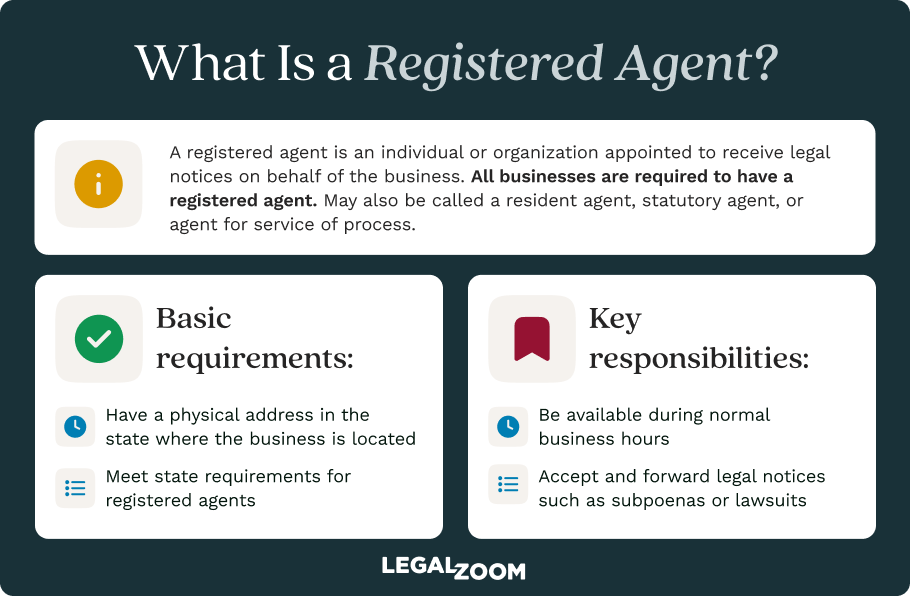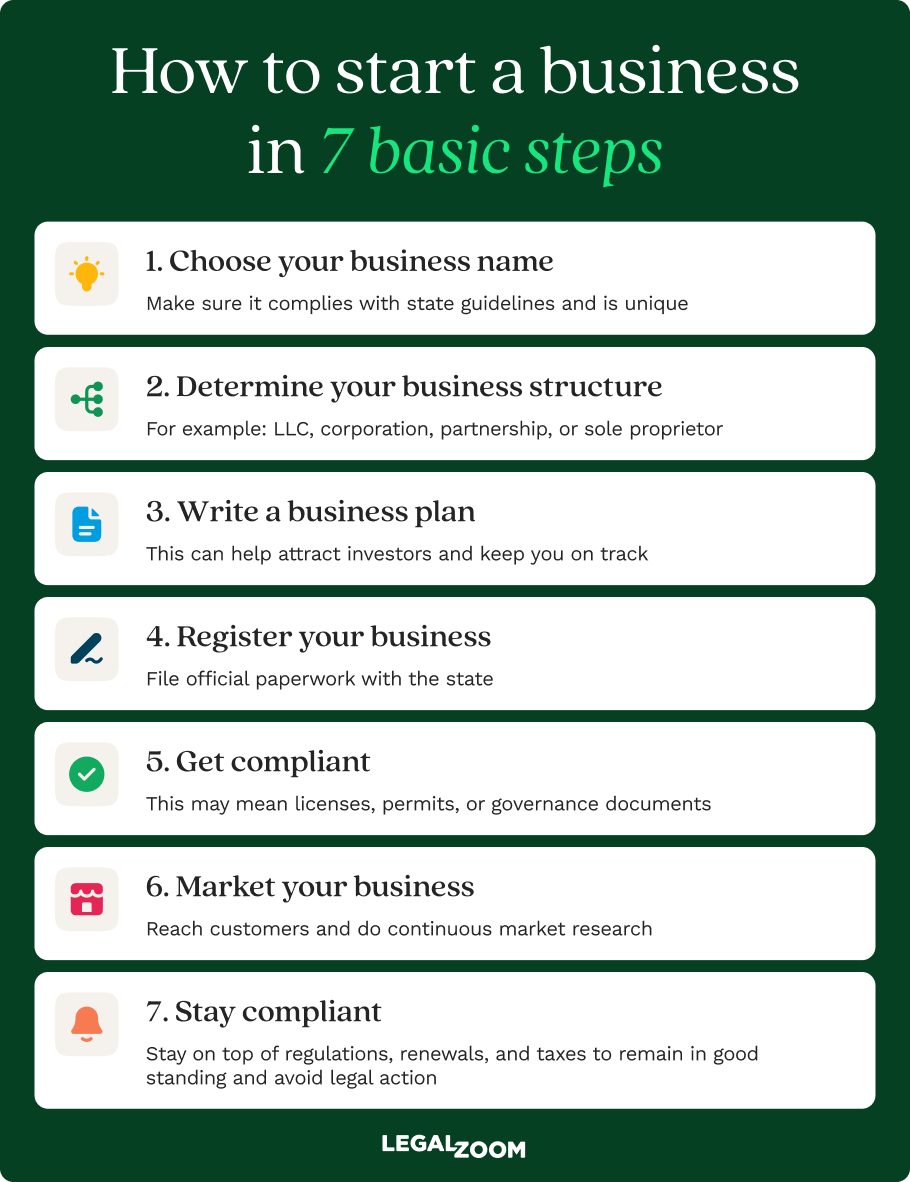There’s a reason Florida continues to be one of the most popular states to open a business. In addition to a strong economy (which grew by 1.4% in Q1 of 2025) and diverse industry opportunities, the Sunshine State offers business-friendly tax policies and levies no income tax for pass-through entities like limited liability companies (LLCs).
Florida limited liability companies provide asset protection and tax advantages, among other benefits, for small businesses. Follow our Florida LLC guide and you'll be on your way to starting your own business.
The Sunshine State business advantage: Why start a Florida LLC?
A Florida LLC offers plenty of benefits for business owners, such as:
- Personal asset protection. A Florida LLC is a separate legal entity from its owners. It can sign contracts, open a bank account, and take out loans all in its own name. When you create an LLC in Florida, you help protect your personal assets by separating business and individual finances.
- Operational flexibility. LLCs in Florida have more flexibility in how they run their business and are subject to fewer regulations than corporations.
- Tax savings. LLC owners can choose to file corporate tax returns as an entity or pass their gains and losses through to their members’ individual tax returns. Since Florida has no individual state income tax, this means only paying federal taxes.
- Low corporate tax rates. Florida ranks #4 on the 2025 State Tax Competitiveness Index. In addition to having no individual state income tax, Florida’s corporate income tax rate is a relatively low 5.5%.
- Tax incentives. Florida offers a wide range of tax incentives to help local industries thrive, including a capital investment tax credit for high-impact startups.
- Workforce training grants. Career Source Florida provides several grants to businesses in qualified industries to help train local talent.
Before you file: Essential Florida LLC requirements
Before you file Florida articles of organization for your LLC, it's best to know exactly what you need ahead of time. This streamlines the process and helps ensure the Florida Department of State (DOS) accepts your application the first time.
Here’s what to prepare.
Florida LLC name rules
The name of your LLC must comply with Florida's naming requirements, or your registration may be rejected. Your business name:
- Must include limited Liability Company, LLC, or L.L.C.
- Must be different from all registered businesses in the state.
- Can’t contain words that refer to a government agency (i.e., State Department, CIA, FBI, Treasury, etc.)
- Can’t contain regulated words (bank, lawyer, attorney, credit union, etc.) without additional documentation and licensure paperwork.
See the Florida Legislature's website for a complete list of Florida's naming rules.
The critical role of your registered agent
Florida law requires you to appoint a registered agent for your LLC.
- A Florida registered agent is a person or entity that receives service of process (notification of a lawsuit) and other official legal documents and notices on behalf of your LLC. This is an extremely important role that helps ensure your business doesn’t miss critical deadlines that could jeopardize your legal status.

You can be your own registered agent or you can choose a registered agent service to handle the responsibilities for you.
Whomever you choose, your agent must meet the following criteria:
- The agent must have a physical street address in Florida. A P.O. box doesn't count.
- The agent must be on-site and available to accept documents during regular business hours.
- If using a company, it must be authorized to conduct business in Florida and provide registered agent services.
Florida business licenses and permits
Florida doesn’t require a general business license to operate in the state. However, several Florida industries may require your LLC to obtain a business license before you can open your doors.
This is particularly important for professional limited liability companies that must have a member who’s a licensed professional to register as such. The Florida DOS has a helpful page on business licenses and permits that can guide your search.
How to start an LLC in Florida: Your step-by-step roadmap
Thanks to Florida’s online business filing system, Sunbiz, starting an LLC in Florida is relatively simple. Just gather the required information and file articles of organization with the DOS. You can also let LegalZoom register for you through our LLC registration service.
If you’d prefer to personally file with the Department of State, follow these steps.

Step 1: Choose your unique business name
First, make sure you’re aware of Florida’s business name requirements. One of the most important rules to follow is ensuring your business name is unique from all other registered Florida companies.
You can conduct a Florida entity search to check if a business already exists under the name you have in mind. If not, you’re ready to move forward!
In addition to the name guidelines listed above, here are some things to keep in mind when selecting a name:
- Distinguishability. Your name must be distinguishable to meet Florida naming standards, but it’s also wise to pick one that’s memorable and easy to spell.
- Existing trademarks. If your business name is too close to that of a registered trademark, you could face legal action—even if the name doesn’t pop up in a search in a Florida business registry.
- Online presence. Even if you don't think you'll need a webpage or social media account, it is wise to retain the option. Make sure your business name doesn’t conflict with other websites or social media handles that could cause confusion. Be sure to snag the domain name and social media handles in case you decide to use them later.
If you aren't ready to register your LLC but are concerned your name might be taken by someone else, you can reserve it for a fee of $25.
Step 2: Appoint your Florida registered agent
Florida's registered agent requirements allow you to be your own agent or to use a professional agent service to handle the responsibility for you. Because your registered agent must be available at their office during regular business hours, LLC owners who want more flexibility with their time may choose to hire an agent service.
In addition to the reliability that comes with expertise, professional agents may also provide additional services, such as a virtual mailbox that can further streamline your business operations.
Step 3: File your Florida articles of organization
Now, you're ready to file! The articles of organization document formally establishes your LLC with the state by laying out basic information about your business.
To prepare Florida LLC articles of organization, file them with the Florida Division of Corporations (Sunbiz). You can either file the document online or send the form by mail to the address listed on the second page.
Here's what you'll need:
- The name and address of the person forming the LLC
- Your LLC name and principal business address
- The name and address of your registered agent ( not a P.O. box).
- The registered agent's signature
- The name and address of members/managers
- The date you want your LLC to become effective, if not your filing date. (optional) This date can't be more than five days prior to or 90 after your filing date.
- A member or authorized representative's signature
- Your name and email (for online applications)
Once you file your articles, the Secretary of State will review the filing. In your application, you can order a certificate that confirms the LLC formally exists, which you’ll receive once the documents are approved. With your approved LLC, you can obtain an employer identification number (EIN), apply for business licenses, and open a business bank account.
The filing fees for Florida LLC registration will cost a minimum of $125: $100 to file articles of organization plus $25 to designate a registered agent. You may pay an additional $30 for a certified copy of your articles (optional), and $5 for a certificate of status (also optional).
Step 4: Create a Florida LLC operating agreement
An operating agreement is a document that outlines the way your LLC will conduct business. It defines things like ownership structure, member responsibilities, and profit-sharing to prevent future disputes or inform court decisions should a dispute arise.
Florida doesn't require your LLC to file an operating agreement, but it's wise for every business to have one. A readily accessible, written operating agreement can help settle disputes that may arise over financial disagreements and other potential litigation. Without one, the courts make determinations based on state law, which may not align with the best interest of the LLC or its members.
Your Florida LLC operating agreement can include, but is not limited to, the following:
- LLC's name and principal address
- Name and addresses of LLC members
- Duration of the LLC (if it has a specific end date)
- Name and address of the registered agent
- Formation date
- Purpose of the business
- Members and their contribution
- Each member's ownership stake in the company, voting rights, and profit share
- The way profits and losses will be divided
- Procedure for admitting new members, as well as outgoing members
- Management of the LLC
- Dissolution terms
- Indemnification and liability clauses
If you're unsure where to begin, starting with a professionally crafted Florida LLC operating agreement template can help you cover the basics and organize your business structure effectively.
- Because every LLC is unique, it's wise to have an attorney review or tailor the final draft—especially if your business has complex ownership terms or operational nuances. This ensures your agreement doesn’t just exist but holds up when it matters most.
Building a business is enough work as it is. We'll help you start your LLC with confidence.

Step 5: Obtain an EIN and open a business bank account
The Internal Revenue Service (IRS) assigns businesses a nine-digit employer identification number (EIN) to identify them for taxes. You can obtain your EIN by mail or online through the IRS. Or, use LegalZoom’s EIN application service if you want assistance with the process.
It’s extremely important to get an EIN so that you can do the following:
- File and manage taxes at the state and federal level
- Obtain business licenses and permits
- Hire employees
- Open a separate business bank account
A business bank account allows you to separate your business and personal finances, which can help with liability protection.
Florida compliance obligations
You’ve officially registered your new business! But, it doesn't end there. Business compliance is an ongoing requirement for every LLC in Florida.
The Florida LLC annual report
All Florida LLCs need to file an annual report with the Division of Corporations. The main purpose of the Florida annual report is to update the state on the basic business information you listed in your initial articles of organization.
Here’s what you need to provide:
- Document number. This is the 6- or 12- digit number that the Division of Corporations assigned to your LLC when you registered.
- Name and principal street address. The name of your LLC can’t be updated on the annual report. If you want to change its name, file an amendment form.
- Federal employer identification number (FEIN). This is the 9-digit number the IRS assigned to your business for federal taxes.
- Mailing address. You only need this if your LLC's mailing address is different from your principal business address. It can be a P.O. box.
- Registered agent’s name, address, and signature. You can designate a new registered agent in your annual report, but you need their written or electronic signature.
- Member/manager names and addresses. Keep in mind, you can’t change general partners on an annual report. To update general partners, file an amendment form.
- Your email address. This is where the Division of Corporations will send your filing confirmation, certificate of status (if requested), and future email communications.
Filing details:
- How to file: Through your Sunbiz account or LegalZoom if you’ve signed up for Compliance Filings.
- How much does it cost: $138.75, plus $5 if you’d like to request a certificate of status. An amendment to change the name of your business or its general partners costs an additional $25.
- When to file: By May 1.
Necessary licenses and permits
Florida doesn't have a general business license to operate in the state. But, depending on the type of Florida business you operate and its location, your Florida LLC may require specific licenses and permits. These include professional licenses, zoning permits, or a business tax receipt.
The business tax receipt is sort of like an operational license. Many Florida cities and counties—such as Miami, Palm Beach, and Orange—require businesses to have one to operate within their borders. Check your local municipality's website for any licenses or permits that your LLC may need.
It's vital to secure necessary licenses and permits before operating to maintain compliance with state regulations. Failure to do so can result in fines or penalties, jeopardizing the success of your Florida LLC.
Obligations for Florida LLCs with employees
- Report all new employee hires or rehires. Within 20 days of hiring or rehiring, LLCs must report new employees to the Florida Department of Revenue.
- Purchase workers' compensation insurance. LLCs must purchase workers' compensation insurance as soon as the fourth person is hired.
- Pay reemployment (unemployment) taxes. This is a requirement for all Florida LLCs with employees.
Starting a business takes courage. LegalZoom makes sure the legal details don’t stand in your way, from the day you register until the day you retire.

Federal & state taxes for your Florida LLC
Make sure to register with the Florida Department of Revenue before you start operating your business. Depending on your location and business purpose, there are several taxes you may need to register for to legally operate in the state.
Below are some of the most common Florida LLC taxes.
State income tax
- Who files: LLCs that elect to file federal tax returns as a corporation.
- How much: 5.5%
- When to file: By May 1, or the first day of the fifth month after your tax year ends. However, if your tax year ends June 30, you must file by November 1.
- Where to file: Online through the Florida Department of Revenue (Form 1120).
Partnership information return
- Who files: Multi-member LLCs that file federal tax returns as a partnership but have at least one owner that’s a corporation.
- When to file: By April 1, or the first day of the fourth month after your tax year ends.
- Where to file: Online through the Florida Department of Revenue (Form 1065).
Sales tax
- Who files: All businesses (foreign and domestic) that buy, sell, rent, lease, or repair tangible (physical) personal property or select services.
- How much: Generally, 6%
- When to file: Between the first and the 20th of the following month after your reporting period ends. So, if your reporting periods are monthly, January sales tax is due from February 1–20. If your reporting periods are quarterly, January to March sales tax is due April 1–20.
- Where to file: Register with the Florida Department of Revenue.
Reemployment (unemployment) tax
- Who files: Businesses that hire employees.
- How much: 2.7% of the first $7,000 of wages paid to each employee in a calendar year, initially.
- When to file: By April 30, July 31, October 31, and January 31.
- Where to file: Register with the Florida Department of Revenue.
Federal income tax
By default, an LLC files federal income taxes as a pass-through entity. That means a Florida single-member LLC files as a sole proprietorship and a multi-member LLC files as a partnership. However, your LLC can elect to file as a corporation instead by filing Form 8832.
In addition to federal income taxes, your LLC may need to file self-employment taxes and employer taxes based on how you file and whether or not you hire employees.
Pros and cons of a Florida LLC
Each state offers different pros and cons when it comes to business formation. Here’s how Florida laws impact LLCs.
Advantages
- No state income tax for pass-through entities
- No franchise tax
- Competitive corporate tax rates
- No double taxation on LLCs that file as corporations (for state income taxes)
- Flexible tax options
- A broad range of tax incentives
- Workforce training grants
- Asset protection (limited liability)
- Flexible management structure
Disadvantages
- Annual report fee
- More complexity than a sole proprietorship
- Sales tax imposed on certain foreign or remote businesses
- Less investment opportunities than a C corporation
- More complex filing systems compared to other states
Considering another state for your LLC?
Here's a quick look at other popular states for LLC formation.
- Arizona has no annual report requirements, low state filing fees, and a fast-growing economy, all reasons to consider an Arizona LLC.
- California boasts one of the world’s largest economies and a range of business incentives for sustainable and other forward-thinking start ups.
- Michigan imposes no city, local, or county sales taxes, just one state sales tax, low, flat-rate income taxes, and competitive formation filing fees.
- Georgia has a flat-rate 6% individual income tax, which can benefit LLCs and other pass-through businesses in the state.
- Ohio has no annual reports, no franchise tax, and a graduated individual income tax rate that’s generally around 3%.
- Delaware is known for its highly-evolved corporate legal system, which makes it a popular state for investors.
- North Carolina has a low 2.5 % corporate income tax rate (at risk of repeal) and relatively competitive property and sales taxes, but high annual filing costs.
- Texas doesn’t impose individual state income tax, but does have high formation fees.
- New York imposes some of the highest taxes in the country, but offers incentives to eligible startups near universities and other tax credits.
Start an LLC in Any State
LegalZoom can help you file your state's formation paperwork for as little as $0 + state filing fees.

LegalZoom: Your trusted partner for Florida LLC formation
LegalZoom has helped form over 4 million businesses to date. Our LLC registration services offer a fast, easy, and affordable way to form your LLC. Here are some of the perks.
- Simplified process. LegalZoom combines technology and expertise to take the guesswork (and paperwork) out of business formation. Our online process can help you start your LLC in minutes.
- Expert support. We’re committed to the highest quality and accuracy. If your filing is rejected or incorrect due to our error, we’ll correct it with the government agency at no additional cost to you.
- A full suite of services. Beyond just LLC formation services, LegalZoom supports all your business filing needs. We provide year-round compliance services, bookkeeping tools, access to attorneys, registered agent services, and trademark registration.
FAQs about forming an LLC in Florida
How much does it cost to start an LLC in Florida?
The cost of a Florida LLC can range from $125–$538 or more. Some of those fees are one-time fees associated with forming your LLC. Other fees are annual and are associated with running your LLC.
Here is a breakdown of the one-time fees associated with having an LLC in Florida:
- Filing fee: $100
- Registered agent fee: $25
- Name reservation fee: $25 (optional)
- Certified copy: $30 (optional)
- Certificate of status: $5 (optional)
Here is a breakdown of some of the annual fees associated with running a Florida LLC:
- Annual report: $138.75
- Annual report received after May 1: $538.75
- Amended annual report: $50
For a complete list of fees for Florida LLCs, visit the Florida Division of Corporations.
How long does it take to form a Florida LLC?
It typically takes the Florida Department of State around a few days to a week to process new business filings. However, online filings tend to be faster than articles sent by mail. This is because the DOS processes articles in the order that it receives them and you can submit online filings instantly.
Do I need a Florida business license?
No, you don't need a general business license to operate in Florida. However, you may need a business tax receipt to operate in certain cities or counties in Florida. Certain professions or business activities may also require you to obtain a specific business license or permit before opening your doors.
You can search the Florida Department of State's business license page as well as your local municipality’s website for any licenses or permits that your LLC may need. LegalZoom also offers a business license service that can do the searching for you.
Can a non-resident form a Florida LLC?
Yes, a non-resident can form a Florida LLC. But, they must have a registered agent with an office in Florida.
Is an operating agreement required in Florida?
No, Florida doesn't require your business to file an operating agreement with the state. However, it's an incredibly useful document that all companies should have to outline how their business will operate and prevent future disputes.
What's the difference between an LLC and a PLLC?
LLC stands for limited liability company, while PLLC stands for professional limited liability company. The major difference is that a professional limited liability company needs to have at least one member who is a licensed professional.
Rudri Bhatt Patel contributed to this article.




